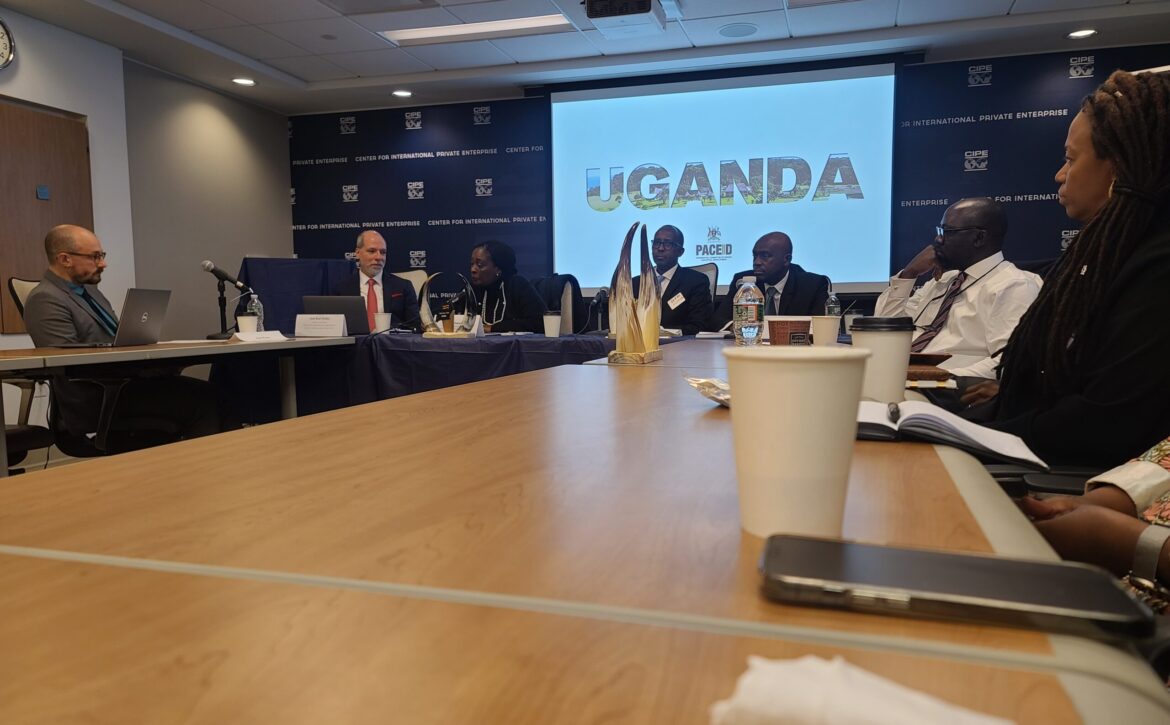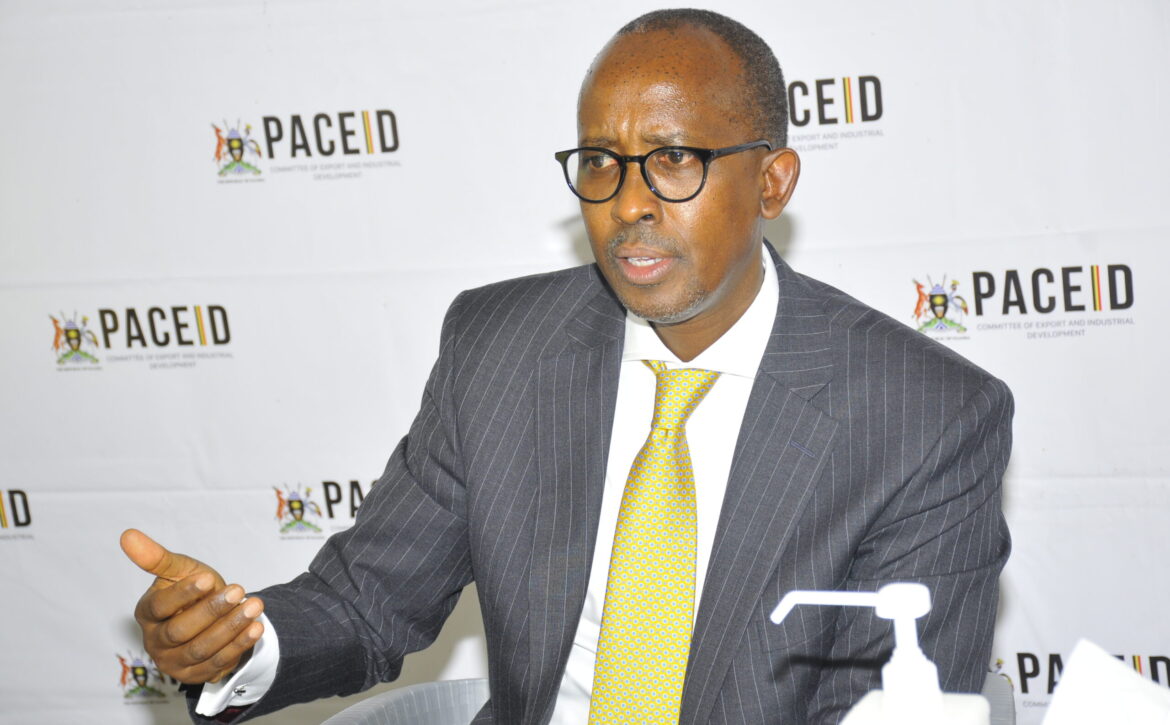Uganda Trade delegation meets US trade representative over proposed AGOA bans
The Uganda trade delegation yesterday met with the US Assistant Trade Representative for Africa, Ms. Constance Hamilton and the US special envoy to advance Human rights of the LGBTQI+ people, Jessica Stern. The meeting took place in Washington DC at the office of the US Trade representative, Ms. Catherine Tai. The Uganda delegation which included Dr. Olivier Kamanzi, Uganda trade representative in Chicago and Ambassador Roby Kakonge, was led by Odrek Rwabwogo, Chairperson of the Presidential Advisory Committee on Exports and Industrial Development (PACEID) and Senior Presidential Adviser on Special Duties.
Rwabwogo made a case for Uganda’s exporters who have for the last 23 years benefited from the Africa Growth Opportunity Act (AGOA) duty and quota free market access to the US and urged US government not use disproportionate force against an ally whose values and relationship have stayed firm on multiple fronts over the years. “Uganda has not violated any trade or human rights law. We continue under President Yoweri Museveni’s capable leadership to score on economic liberalism, supporting free enterprise, protecting our environment, making laws on food safety and building our trade standards”.
He said, “We have never lost our vigour for protecting minorities, workers and leading the charge on regional stability along with ending extreme poverty to keep our nation stable and growing”. He asked, “How can a government that promotes free enterprise, freed women and gave them education and representation along with people with disabilities and hosts over 1.6m refugees be called a violator of human rights of her people? It is a contradiction of mega proportion”.
Rwabwogo said, “We are your best friends for an open engagement with Africa but this has to be done in a respectful and dignified manner especially, on the matters of freedom and rights that you might have. Our leadership has been defenders and fighters for freedom of African people and all our allies and humanity since 1965”. He said Uganda takes exception at the weekly threats and statements sent against people who want to trade with Uganda or visitors, academicians and person to person exchange. These statements you issue to our allies and trading partners on a monthly basis are unacceptable way to communicate to allies and don’t show good will”.
He asked the US government not mix wrong perceptions picked from data sources that aren’t verifiable with our own systems and leaders and use them to judge us harshly. The US state department has lately issued travel advisories, proposed visa restrictions and threatened to remove Uganda from AGOA list, all in three months.
Rwabwogo said, “The US is an important ally and a big signaling market to us and the world in terms of raising capital and technology for enterprises. At USD 18trillion consumption on this market, there is nowhere else we want to be as Ugandans, the reason we have two trade representatives for Uganda in the Mid-west and why President Museveni visited you in December of 2022”.
He added, “If even some of your adversaries who are super powers keep coming here for conversations, why should Uganda be silent when you seem to want to destroy the little trade shoots that are coming up? These trade shoots give jobs to women and youth entrepreneurs who have boot strapped to build their businesses and should be protected from politics”
Uganda’s and US trade in the last three years averages UGX 1.9trillion (about USD550m) with a heavy trade imbalance in favour of the US that sells to Uganda aircraft parts, computers, used clothing, machine parts, generators etc. Uganda exports coffee, vanilla beans, chocolate, dairy products, fish etc. President Joe Biden in October wrote to the speaker of the US House of representatives, Mike Johnson seeking to terminate Uganda’s eligibility on AGOA list of countries in 2024 on account of the gay act passed by Uganda’s parliament in May. Uganda has increased its efforts for trade with the world aiming at USD 6bn in the next five years. PACEID has a target of USD 1bn on the US market and is opening trade hubs in key markets of the world.
Ms. Hamilton said Uganda’s anti homosexuality law ‘demonizes gay people and goes against the values President Biden’s government adheres to. She said, “words matter and this law and the words it uses horrifies many people in the US”. Rwabwogo explained the context of the law as an effort to protect children from the onslaught of curriculum and content that should not be exposed to minors. He asked for rescinding of the January 2024 deadline to allow for more engagement between the two countries in order to protect trade relations. Jessica Sterns raised concerns on what she called ‘documented attacks on gay people and arrests and property damage which causes fear to gay people’. Ambassador Kakonge agreed to follow up on the report from US special envoy on the human rights of the LGBTQ persons.
Dr Kamanzi, who is helping Uganda in Chicago to raise export credit funding and open markets for Uganda said, “I visit Uganda regularly and I have travelled to all corners of the country and I have not seen the claims being made here being committed in Uganda. On the contrary I live in South Side Chicago and I am an American citizen. I am sadly aware every weekend our city of Chicago loses 55 people to gun violence. Should we not be concerned about our internal US issues rather than using disproportionate power against a small peaceful country? He asked.
Earlier, the Uganda delegation which included exporters of leather bags (Seko designs/Arise Kollections), vanilla (Simons Vanilla), fruits and vegetables (Jacana fruits) were hosted by the Centre for International Private Enterprise (CIPE) who invited over 45 corporate business in the US, NGOs, civic groups to explain Uganda’s trade and democracy journey over the also couple of years. Some of the US companies and institutions that attended the meeting included Transformative Energy who are working on green energy projects in Uganda, Boeing Aircraft Corporation, manufacturers of fertilizers, producers of beverages, bankers, lawyers and the Africa Trade Development Center, activists for AGOA extension in Washington DC.
The Uganda delegation met the Hudson institute, members of Congress and address the Press later on Friday.




